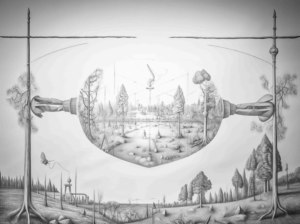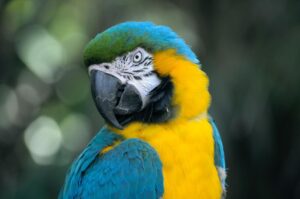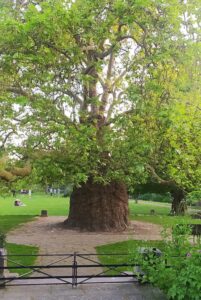 July 25-26, 2024
July 25-26, 2024
AI and Other Scientific Fables
October 23, 2024
Cyber/AI Fables: Creative Writing (and Crafting) Session
 Please join us for ‘Cyber/AI fables’, in which we will create together fables that explore the ethical, social, and personal impacts of artificial intelligence and other digital technologies on our lives. We will also collaborate with AI to visualise our fables.
Please join us for ‘Cyber/AI fables’, in which we will create together fables that explore the ethical, social, and personal impacts of artificial intelligence and other digital technologies on our lives. We will also collaborate with AI to visualise our fables.
Fables, traditionally short stories with moral lessons featuring humanised animals and/or other non-humans seem to be rapidly evolving in the age of AI. A new type of talking non-human, in the form of virtual assistants, chatbots, etc., is becoming an integral part of our lives, influencing personal decisions, various aspects of society, and our ways of being. Unlike traditional fable creatures, these AI characters do not just simulate and embody human values, but actively co-create stories and morals for us. This is not only changing our definition of what it means to be human, but also our thinking and creative processes.
In a landscape where AI seems to be able to write and illustrate fables as well as or better than humans, what kinds of new fables could we create to explore our relationship with AI and other new technologies? What are our fears, hopes, and concerns about our co-existence/evolution, and what kinds of stories can we write (or co-write with AI) to make better sense of new human-machine relationships? And if we are to write fables for AI, what shapes would the stories take? Please join our creative session to explore these issues.
This workshop is part of the AHRC-funded project ‘Rethinking Fables in the Age of Global Environmental Crisis’, led by Dr Kaori Nagai (School of Classics, English and History). We are holding the event in collaboration with the Institute of Cyber Security for Society (iCSS), as part of their 2024 Cyber Security Awareness Month.
 October 25, 2024
October 25, 2024
Animal Languages (online)
The fable is a literary genre which typically features talking nonhuman characters. This means that, whenever we hear an animal speak, whether it is an animal on screen or our cat at home, we are transported into the realm of the fable – especially if we learn something from their speech and story.
This workshop explores animal language and talking animals, key features of the fable genre. Going beyond the genre’s anthropocentric use of nonhuman characters to convey human values and messages, we will rethink and reimagine the fable through the issues of animal and interspecies communication, and the nature of ‘animal language’. The session is followed by an ‘animal language’ writing session, convened by the poet Susan Richardson.
Session 1 Bios/Abstracts
Speakers
Leonie Cornips (NL-Lab, Humanities Cluster KNAW & Maastricht University), Intraspecies and interspecies acknowledgements by the dairy cow
Ana M. Ochoa (Tulane University), Vocalization as the philosophical site of struggle between the animal and the human
Andrea Gutiérrez (University of Texas at Austin), An Appraisal of Animal Language in Early India from Parrot to Elephant
Session 2:
Animal Language workshop (with Susan Richardson)
This writing workshop will encourage us to rethink, and expand the representation of, animal voices in fables by focusing on the figure of the selkie. We will engage with both audio and visual prompts, while examples of published works in which writers grapple with the challenge of speaking, transcribing and translating the language of another species will also be offered. There will be the opportunity to experiment with the idea of creating a hybrid seal-human language through the medium of either poetry or prose, and, following a focused period of writing, time will also be devoted to sharing and feedback.
Susan Richardson is a writer, performer and educator whose work of creative nonfiction, Where the Seals Sing (William Collins, 2022), is a deep dive into the lives of Atlantic grey seals, blending natural history and travel, science and shamanism, memoir and myth. Her most recent collection of poetry, Words the Turtle Taught Me, emerged from her residency with the Marine Conservation Society and was shortlisted for the Ted Hughes Award. She has also been writer-in-residence with both the British Animal Studies Network and the global animal welfare initiative World Animal Day, and enjoyed a four-year stint as one of the poet-performers on Radio 4’s Saturday Live.
 November 20, 2024, 2-4pm
November 20, 2024, 2-4pm
Writing Environmental Fables in Kent
Creative writing workshop
Facilitator: Shreyasi Sharma
Please join us for ‘Writing Environmental Fables in Kent’, a creative writing workshop, in which we invite you to write a fable which addresses environmental issues close to your heart. Through fables – short narratives which give voice to nonhumans and convey moral lessons – we will explore our relationships with the environment, natural forces and other species, and meet like-minded individuals to share concerns. We are delighted to have Shreyasi Sharma, an Indian writer passionate about environmental issues, as our facilitator.
Please bring ideas for environmental issues you would like to explore and write about. This can be anything – extreme weather, global warming, pollution, deforestation, urbanisation, species extinction, multispecies relations, food security, energy concerns, etc. We are particularly interested in making fables out of issues here in Kent, in order to explore global environmental crisis as that which impacts each one of us personally. We also encourage you to bring some objects which speak to your topics and interests – for example: leaves, shells, maps, photos, your own drawings, field notes, sound recordings. We intend to take innovative and experimental approaches, and these objects will be part of our fable writing session. We welcome participants from different backgrounds and disciplines bringing their knowledge and methodologies to the workshop. We will spend most of our time writing a fable.
Shreyasi Sharma is a writer and educator from India. She was the 2023 Charles Wallace India Trust Creative Writing Fellow at University of Kent. She writes poems and essays on transforming spaces. Her words have appeared in many journals, and in 2022 Red River Press published her poems and narrative non-fiction about the city in an anthology titled Of Dry Tongues and Brave Hearts. Her recent essay, ‘Crows in this part of New Delhi’ was published in Rumpus, 2024. She is currently working on a nonhuman novella.
This workshop was part of the AHRC-funded project ‘Rethinking Fables in the Age of Global Environmental Crisis’, led by Dr Kaori Nagai (School of Classics, English and History, University of Kent), in collaboration with Kent’s Centre for the Sustainable Built Environment.